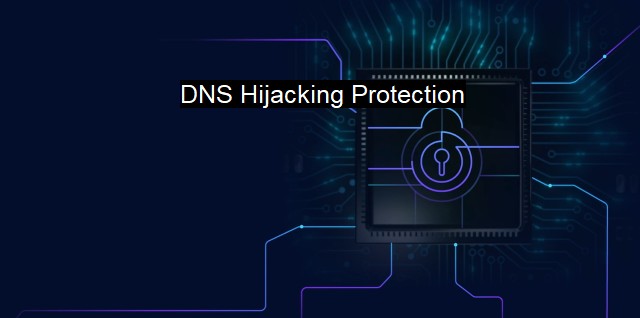What is DNS Hijacking Protection?
Protecting Yourself from DNS Hijacking: Understanding the Tactics of Cybercriminals and the Importance of DNS Hijacking Protection in Cybersecurity Applications
Domain Name System (DNS) Hijacking, also called DNS redirection, is a type of malicious attack that manipulates the DNS resolution process in order to redirect internet users from legitimate websites to fraudulent ones. The objective of this stealthy cyber threat is typically fraud or espionage. One of the effective ways to shield oneself against such threats is through "DNS Hijacking Protection."DNS is a crucial part of the Internet's infrastructure and acts as the Internet's phonebook. When you type a web address into your browser, the device contacts a DNS server that translates that URL into a machine-readable IP address, enabling you to access the desired site. If the DNS process is highjacked or altered in any way, user requests could be redirected to malicious servers unbeknownst to the user.
DNS Hijacking Protection refers to various strategies, techniques, and tools that help secure the DNS process from being exploited by malicious actors. The liberation of DNS Hijacking Protection is becoming an essential component and numerous antivirus solutions have integrated protections tailored to thwart DNS hijacking attempts.
For instance, several antivirus software has developed features that prevent DNS hijacking by hackers from redirecting victims to phishing sites that simulate legitimate websites to capture credentials. These antivirus programs automatically enforce a secure DNS server connection when browsing the internet, preventing any unwelcome DNS server assignments that could redirect users to malicious websites.
DNS Hijacking Protection can also entail the employment of Domain Name System Security Extensions (DNSSEC), a suite of extensions that bolsters the DNS's security. DNSSEC thwarts DNS hijacking by adding a layer of verification to the DNS lookup process. It digitally signs DNS data to authenticate the source and verify the data's integrity. This reduces the likelihood of DNS spoofing – where hackers manipulate data to mislead the DNS resolver – by enabling the DNS resolver to confirm the data is original and not manipulated.
Further strategies for DNS Hijacking Protection involve the application of advanced security protocols such as Hypertext Transfer Protocol Secure (HTTPS) and DNS over HTTPS (DoH). These protocols ensure that communication over the internet is completely encrypted and secure by encrypting the data between the user's browser and the website they're visiting. This hinders potential eavesdroppers or cybercriminals from intercepting and manipulating users' DNS queries.
In an organizational setting, DNS Hijacking Protection often encompasses enterprises securing their DNS servers against potential threats. Companies would often utilize firewalls with intrusion prevention systems (IPS), enforced DNSSEC usage, rigorous patch management strategies, and regular network security audits to reduce their vulnerability to DNS hijacking attempts.
Beyond protection through software and technology, enlightening internet users about the risks and manifestations of DNS hijacking is imperative. Chattels like secure browsing habits, vigilance towards phishing content, regular password changes, and using secure and up-to-date devices can offer users a reliable line of defense against DNS hijacking.
DNS Hijacking Protection is a multifaceted approach to securing the internet's central address system against manipulation by malevolent cyber actors. With the escalating nature and sophistication of cyber threats, tools that offer DNS Hijacking Protection are more critical than ever, enhancing cybersecurity structures and encouraging users to maintain secure browsing habits.

DNS Hijacking Protection FAQs
What is DNS hijacking protection?
DNS hijacking protection is a security feature that helps prevent cybercriminals from redirecting website traffic to malicious websites that can steal sensitive data, install malware, or launch other types of cyber attacks. It is a critical component of cybersecurity and antivirus software that helps safeguard your computer and network from online threats.How does DNS hijacking protection work?
DNS hijacking protection works by monitoring DNS requests and ensuring that the IP addresses returned by the DNS server match the ones associated with the domain name. If a mismatch is detected, the security software alerts the user and blocks the connection to the suspicious website. Some DNS hijacking protection solutions also use encrypted DNS protocols to prevent attackers from intercepting and tampering with the DNS traffic.What are the benefits of using DNS hijacking protection?
The benefits of using DNS hijacking protection include enhanced security and privacy, improved network performance, and a reduced risk of falling victim to phishing scams, malware infections, and other online threats. By blocking unauthorized DNS changes, this security feature can prevent cybercriminals from redirecting traffic to fake websites or stealing login credentials and other sensitive information. It can also help protect your network and devices from malware infections that could compromise your data or cause system crashes.How can I get DNS hijacking protection?
You can get DNS hijacking protection by installing a reputable antivirus or cybersecurity software that includes this feature. Most modern antivirus programs offer DNS hijacking protection as a standard feature, but you should always check the product specifications and read reviews from other users to ensure that you're getting a reliable solution that fits your needs. Some standalone DNS hijacking protection tools are also available as browser extensions or network utilities.| | A | | | B | | | C | | | D | | | E | | | F | | | G | | | H | | | I | | | J | | | K | | | L | | | M | |
| | N | | | O | | | P | | | Q | | | R | | | S | | | T | | | U | | | V | | | W | | | X | | | Y | | | Z | |
| | 1 | | | 2 | | | 3 | | | 4 | | | 7 | | | 8 | | |||||||